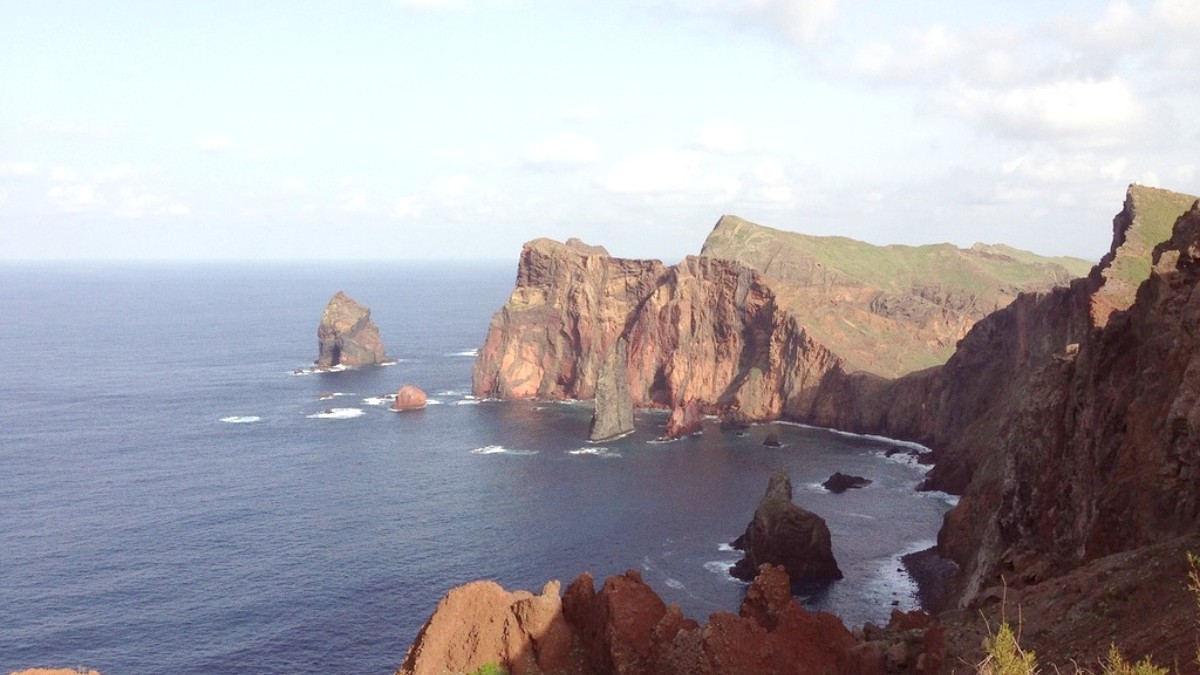
Portugal
Summer (June-September): Expect warm and dry weather. Average temperatures generally range from 22°C to 26°C (72-79°F). This period features the highest sunshine hours, making it ideal for beach activities and water sports. The ocean temperature is at its warmest, inviting swimming and other aquatic pursuits.
Winter (December-February): This season brings mild conditions. Average temperatures hover between 16°C and 19°C (61-66°F). While milder than most of Europe, this period holds higher precipitation, notably from November to January. Even in winter, Funchal rarely sees very cold temperatures, and greenery keeps its lush appearance.
Madeira's varied topography brings about microclimates; weather can differ significantly between coastal areas and higher altitudes. You might experience sunshine in Funchal and mist or rain in the mountains on the same day. Occasional "Leste" winds, from the Sahara, can bring warmer, drier, dusty air to the island, though these are infrequent.
Extreme weather events like severe storms are rare, but heavy rainfall may lead to localized landslides or flooding in mountainous regions, specifically during winter. Always check local forecasts, notably before heading into the interior.
June to September, holiday peaks
Warmest weather, ideal for beaches, lively atmosphere.
Crowds, higher prices for flights and accommodation.
April-May and October-November
Pleasant weather, fewer crowds, moderate prices, good for hiking.
Increased chance of rain, specifically late autumn.
December-March (excluding holidays)
Mild winter, lush landscapes, lower prices, fewer tourists.
Higher chance of rain, cooler temperatures for swimming.
Portugal belongs to the Schengen Area, which simplifies European travel for many nationalities.
This visa permits stays of up to 90 days within any 180-day period across the Schengen zone. Many non-EU/EEA/Swiss nationals need this visa. Apply through the Portuguese embassy or consulate in your home country before your trip. The process typically comprises submitting forms, supporting documents, and attending an interview. Start this process well in advance.
For planned stays in Funchal exceeding 90 days (for purposes like work, study, or residency), a long-stay visa is necessary. These visas call for a more comprehensive application process and must be obtained from Portuguese authorities in your country of residence prior to travel.
Valid for 3 months beyond departure, issued within 10 years, two blank pages.
Proof of planned departure from the Schengen Area.
Confirmed hotel bookings, rental agreement, or invitation letter.
Evidence of financial resources to cover your stay.
Mandatory for Schengen visa applicants; minimum €30,000 coverage. Purchase World Nomads, SafetyWing, or Insubuy.
Travel costs vary significantly based on your preferred travel style, from budget-friendly adventures to luxury getaways.
The official currency in Funchal, as in the rest of Portugal and the Eurozone, is the Euro (€).
Here are typical costs for common items:
This table gives approximate daily costs, excluding international flights.
Madeira presents a very safe destination, but standard precautions are always prudent.
No specific vaccinations are necessary for entry to Portugal for most nationalities. However, routine vaccinations should be current.
For personalized advice, consult your doctor or a travel clinic at least 4-6 weeks before your trip, considering your medical history and travel plans.
Portugal offers both public (SNS) and private healthcare systems. Funchal features modern medical facilities, including Hospital Dr. Nélio Mendonça, the main public hospital equipped for emergencies.
Emergency Number: Dial 112 for all emergencies (Police, Fire, Ambulance).
For non-emergencies, contact your travel insurance provider for guidance.
Tap water in Funchal is generally safe for consumption. Bottled water is widely available. Food hygiene standards in restaurants and cafes are high, following European Union rules.
Tap water is safe; a LifeStraw filter offers backup.
Eat street food from busy vendors who prepare food freshly.
Funchal is a reputation as a very safe city with low crime rates. Petty crime, like pickpocketing, may occur in crowded areas.
Remain vigilant in crowded areas; keep valuables out of sight. Consider Pacsafe products.
Heavy rainfall can cause localized landslides; follow local news. Seismic activity is rare.
| Concern | Prevention Strategy | Recommended Item |
|---|---|---|
| Sunburn/Heatstroke | Apply sunscreen often, wear a hat, stay hydrated. | High SPF sunscreen, Wide-brimmed hat. |
| Dehydration | Drink plenty of water throughout the day. | Reusable water bottle. |
| Falls (steep streets) | Wear appropriate, supportive footwear with good grip. | Supportive walking shoes. |